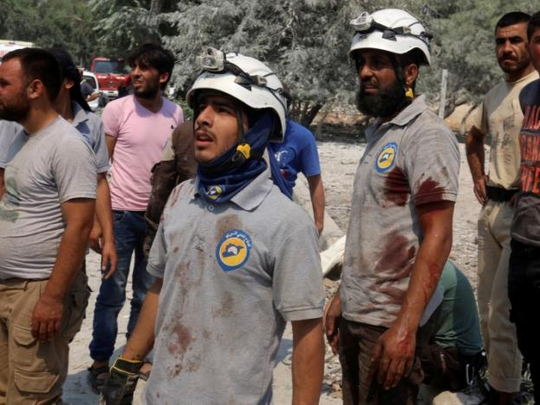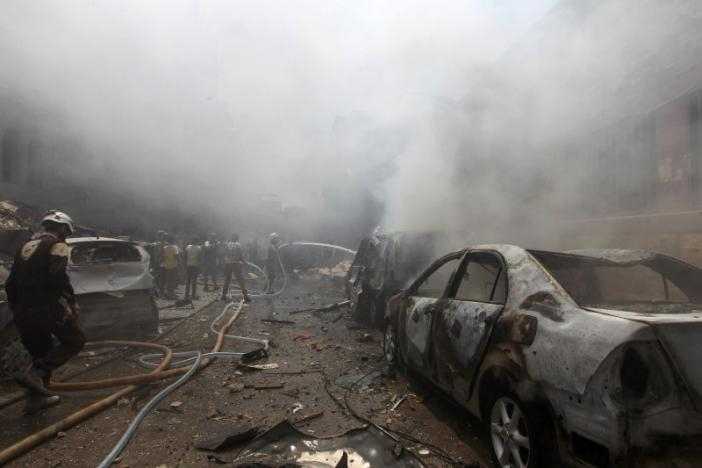
Beirut, Lebanon / Cilvegozu, Turkey: Aid for the divided Syrian city of Aleppo was stuck on the Turkish border on the fifth day of a fragile ceasefire on Friday with rival factions arguing over how the supplies are to be delivered and violence increasingly undermining the truce.
The provision of aid to what was Syria's largest city before the war is a critical test of the ceasefire, brokered by the United States and Russia a week ago with the aim of reviving talks on ending the conflict.
Humanitarian access to Aleppo hinges on control of the main road into the besieged rebel-held part of the city, divided between the government and rebels who have been battling to topple President Bashar al-Assad for more than five years. The Castello Road has become a major frontline in the war.
Russia said the Syrian army had begun to withdraw from the road on Thursday, but insurgent groups in Aleppo said they had seen no such move and would not pull back from their own positions around the road until it did so.
"By today this morning nothing had happened on the Castello Road ... There is nothing new in Aleppo," Zakaria Malahifji, of the Aleppo-based rebel group Fastaqim, told Reuters by phone.
The Kremlin said it was using its influence to try to ensure the Syrian army fully implemented the ceasefire and that it hoped the United States would use its own influence with rebel groups too.
"In general, we can still state that the (ceasefire) process is moving forward, despite some setbacks," Kremlin spokesman Dmitry Peskov told reporters on a conference call.
U.N. frustration
Hundreds of protesters from the Shi'ite Muslim villages of Nubul and al Zahra - which lie in government-held territory - were meanwhile heading towards the Castello Road with the aim of blocking it and obstructing the passage of aid trucks, an organization that monitors the war said.
The Syrian Observatory for Human Rights said they had come out to prevent aid entering rebel-held eastern Aleppo until there were guarantees that supplies would also be sent to the besieged Shi'ite villages of Kefraya and al-Foua which have been surrounded by insurgents since April 2015.
The United Nations, which says it asked the Syrian government for permission to reach all besieged areas, has voiced increasing frustration in recent days at the failure of the Syrian government to allow access.
"In order to actually initiate the actual movement of these convoys (to besieged areas) we need the facilitation letters. They have not come," Jens Laerke, spokesman for the U.N. Office of Humanitarian Affairs, told a briefing in Geneva.
"It's highly frustrating ... and of course we urge the authorities and everyone with influence over those authorities to push for these letters to materialize as soon as possible."
Two convoys of aid have been waiting since early on Tuesday in no-man's land at the Turkish border for permission to travel into Syria. A U.N. spokesman said the first convoy of trucks was carrying flour for more than 150,000 people, while the second was carrying food rations for 35,000 people for a month.
About 300,000 people are thought to be living in eastern Aleppo, while more than one million live in the government-controlled western half of the city.
Truce violations
The government and rebels have accused each other of violating the ceasefire, although the U.S. State Department said on Thursday it was largely holding and that both Washington and Moscow believed it was worth continuing.
The United States and Russia have backed opposing sides in the war, which has killed hundreds of thousands of people, forced 11 million from their homes, and created the world's worst refugee crisis since World War Two.
After three days which saw a significant decrease in violence and no deaths, the first civilians since the start of the truce were killed on Thursday.
Three more died and 13 were injured in air strikes in rebel-held Idlib province on Friday, the Observatory said. A number of shells were also fired by insurgents into besieged al-Foua and Kefraya.













